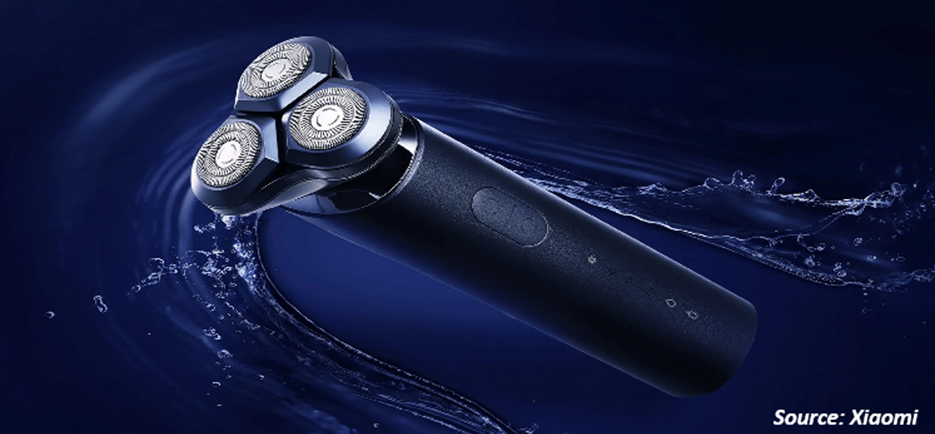
Germany Electric Shaver Market by Usability (Dry and Wet or Dry), by Product Type (Rotary Shaver, Trimmer/Clipper, and Foil Shaver), by Power Source (Rechargeable and Battery Powered), by End User (Men and Women), and by Distribution Channel (Health & Beauty Stores, Electric Stores, Supermarkets, Hypermarkets, and Online) - Opportunity Analysis and Industry Forecast, 2024– 2030
Industry: Retail and Consumer | Publish Date: 25-Jul-2024 | No of Pages: 112 | No. of Tables: 79 | No. of Figures: 44 | Format: PDF | Report Code : N/A
Germany Electric Shaver Market Overview
The Germany Electric Shaver Market size was valued at USD 1.18 billion in 2023, and is predicted to reach USD 1.51 billion by 2030, at a CAGR of 3.0% from 2024 to 2030. The electric shaver industry is a part of the personal care and grooming sector. The electric shaver market consists of shavers, trimmers, and clippers. It specializes in designing, developing, and selling electric devices to remove facial and body hair efficiently. Electric shavers are distinguished by their rotating or oscillating blades and their reliance on electricity to operate. The key features of the electric shaver industry include the use of cutting-edge technologies, such as improved blades, ergonomic designs, wet and dry shaving capabilities, and smart features in some models. The industry also caters to a variety of consumer segments with different grooming preferences, offering cordless operation, adjustable cutting lengths, and specialized attachments.
Increasing Disposable Income Across the Region Propels the Market Germany Electric Shaver Market Expansion
In the electric shaver sector, a notable trend is emerging due to the rising disposable incomes of consumers worldwide. Economic prosperity and increased purchasing power are driving the demand for grooming products, especially electric shavers. This financial empowerment enables consumers to prioritize personal grooming, emphasizing the importance of premium grooming solutions.
With enhanced discretionary spending, consumers are favoring electric shavers equipped with advanced features and technologies, offering superior convenience and performance. Premium brands are strategically positioned to exploit this trend by launching innovative products tailored to meet the evolving preferences of discerning consumers.
Rising Personal Grooming Culture in the Region Drives the Germany Electric Shaver Market Growth
The escalating recognition of personal grooming and presentation is propelling the demand for grooming electronic wares, particularly electric shavers. Social media platforms have emerged as pivotal tools in heightening awareness regarding self-image and physical appearance, prompting individuals to meticulously attend to their grooming rituals to maintain a refined online identity.
Additionally, societal and professional expectations consistently mandate the importance of a well-maintained appearance, whether in professional environments or social gatherings. This imperative to meet grooming standards is further fueled by prevalent fashion trends and the influence of notable figures and influencers who establish grooming benchmarks.
The accessibility and assortment of grooming merchandise, including electric shavers, have augmented the customization and ease of personal grooming, accommodating diverse preferences and schedules.
High Upfront Cost and Availability of Conventional Alternatives Hinder the Industry's Growth
The electric shaving industry confronts obstacles stemming from substantial initial investments and the enduring popularity of conventional alternatives such as manual razors. Many electric shavers' relatively steep price tags may dissuade frugal consumers favoring traditional grooming implements for their cost efficiency.
Moreover, entrenched consumer familiarity with conventional choices including safety razors presents a formidable hurdle to widespread electric shaver adoption. Concerns regarding durability, perceived value, and entrenched cultural grooming norms further compound consumer reluctance.
Addressing these challenges necessitates strategic pricing, targeted marketing accentuating electric shavers' advantages, and sustained innovation to bolster their allure and competitive standing vis-a-vis traditional alternatives in a multifaceted grooming landscape.
Integration of Nanotechnology Blades Creates Significant Opportunity Growth for the Germany Electric Shaver Market
Nanotechnology blades represent a significant advancement in the electric shaver market, leveraging nanoscale manipulation to create blades with unparalleled sharpness and cutting performance.
By operating at the atomic or molecular level, these blades ensure a remarkably close shave with minimal irritation, revolutionizing the shaving experience for consumers. Unlike traditional blades that may pull or tug at hair follicles, nanotechnology blades glide effortlessly, resulting in smoother outcomes and heightened comfort.
Furthermore, their microscopic sharpness extends their lifespan, reducing the need for frequent blade replacements and enhancing overall durability. This innovation addresses the evolving needs of consumers who prioritize superior performance and convenience in their grooming routines, positioning nanotechnology blades as a compelling solution for the future of electric shavers.
Competitive Landscape
The market players operating in the Germany electric shaver industry include P&G (Braun), Koninklijke Philips N.V., Panasonic Corporation, Remington, Wahl Clipper Corporation, Andis Company Inc., Conair Corporation, Shanghai Flyco Electrical Appliance Co Ltd, Xiaomi, MANSCAPED, and others.
Germany Electric Shaver Market Key Segments
By Type
-
Dry
-
Wet or Dry
By Product Type
-
Rotary Shaver
-
Trimmer/Clipper
-
Foil Shaver
By Power Source
-
Rechargeable
-
Battery Powered
By End User
-
Men
-
Women
By Distribution Channel
-
Health & Beauty Stores
-
Electric Stores
-
Supermarkets
-
Hypermarkets
-
Online
REPORT SCOPE AND SEGMENTATION:
|
Parameters |
Details |
|
Market Size in 2023 |
USD 1.18 Billion |
|
Revenue Forecast in 2030 |
USD 1.51 Billion |
|
Growth Rate |
CAGR of 3.0% from 2024 to 2030 |
|
Analysis Period |
2023–2030 |
|
Base Year Considered |
2023 |
|
Forecast Period |
2024–2030 |
|
Market Size Estimation |
Billion (USD) |
|
Growth Factors |
|
|
Companies Profiled |
10 |
|
Market Share |
Available for 10 companies |
|
Customization Scope |
Free customization (equivalent up to 80 working hours of analysts) after purchase. Addition or alteration to country, regional, and segment scope. |
|
Pricing and Purchase Options |
Avail customized purchase options to meet your exact research needs. |
KEY PLAYERS
-
P&G (Braun)
-
Koninklijke Philips N.V.
-
Panasonic Corporation
-
Remington
-
Wahl Clipper Corporation
-
Andis Company Inc.
-
Conair Corporation
-
Shanghai Flyco Electrical Appliance Co Ltd
-
Xiaomi
-
MANSCAPED




 Speak to Our Analyst
Speak to Our Analyst


































